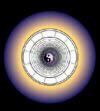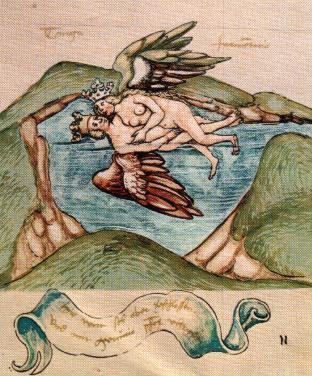|
What
is?
Everything, really. Or, well, lots of things. That So? Yep. |
Introduction
|
|
adjective
verb,
transitive
|
Rosarium Philosophorum, 1550 But
here, Sol is enclosed / And poured over with "Mercurio philosophorum".
|
|
A
human without a magic wand is as castrated as a man without a penis. Ein
Mensch ohne Zauberstab ist so kastriert wie ein Mann ohne Penis. |
Magic
is the Highest, most Absolute, and most Divine Knowledge of Natural
Philosophy, advanced in its works and wonderful operations by a right
understanding of the inward and occult virtue of things; so that true
Agents being applied to proper Patients, strange and admirable effects
will thereby be produced. Whence magicians are profound and diligent
searchers into Nature; they, because of their skill, know how to anticipate
an effect, the which to the vulgar shall seem to be a miracle.
The Goetia of the Lemegeton of King Solomon |
|
Magick is the Science and Art of causing Change to occur in conformity with Will. (Illustration: It is my Will to inform the World of certain facts within my knowledge. I therefore take "magickal weapons", pen, ink, and paper; I write "incantations"---these sentences---in the "magickal language" ie, that which is understood by the people I wish to instruct; I call forth "spirits", such as printers, publishers, booksellers and so forth and constrain them to convey my message to those people. The composition and distribution of this book is thus an act of Magick by which I cause Changes to take place in conformity with my Will.) Alistair
Crowley |
Our
purpose is to conciously, deliberately evolve toward a wiser, more
liberated and luminous state of being; to return to Eden, make friends
with the snake and set up our computers among the wild apple trees.
Deep down, all of us are probably aware that some kind of mystical
evolution is our true task. Yet we supress the notion with considerable
force because to admit it is to admit that most of our political gyrations,
religious dogmas, social ambitions and financial ploys are not merely
counterproductive but trivial. Our mission is to jettison those pointless
preoccupations and take on once again the primordial cargo of inexhaustible
ecstasy. Tom
Robbins |
|
Magic,
in light of modern physics, quantum theory and probability theory is
now approaching science. We hope that a result of this will be a synthesis
so that science will become more magical and magic more scientific. The
universe is full of magical things patiently waiting for our wits to
grow sharper. |
Science
is always discovering odd scraps of magical wisdom and making a tremendous
fuss about its cleverness. The Confessions of Aleister Crowley, ch. 64 (1929; rev. 1970), referring to Freudian theories.
Arthur
C. Clarke's
Third Law: |
|
Thus
the analogy between the magical and the scientific conceptions of the
world is close. In both of them the succession of events is perfectly
regular and certain, being determined by immutable laws, the operation
of which can be foreseen and calculated precisely; the elements of caprice,
of chance, and of accident are banished from the course of nature. Both
of them open up a seemingly boundless vista of possibilities to him
who knows the causes of things and can touch the secret springs that
set in motion the vast and intricate mechanism of the world. Hence the
strong attraction which magic and science alike have exercised on the
human mind; hence the powerful stimulus that both have given to the
pursuit of knowledge. They lure the weary enquirer, the footsore seeker,
on through the wilderness of disappointment in the present by their
endless promises of the future: they take him up to he top of an exceeding
high mountain and shew him, beyond the dark clouds and rolling mists
at his feet, a vision of the celestial city, far off, it may be, but
radiant with unearthly splendour, bathed in the light of dreams. |
The
profession of magician is one of the most perilous and arduous specialisations
of the imagination. On the one hand there is the hostility of god and
the police to be guarded against; on the other it is as difficult as
music, as deep as poetry, as ingenious as stage-craft, as nervous as
the manufacture of high explosives, and as delicate as the trade in
narcotics. |
| Back |

